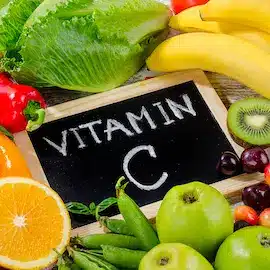Vitamin C, also known as ascorbic acid, is a water-soluble vitamin and antioxidant that is needed for a healthy immune system. Water-soluble vitamins are easily excreted in the urine, which means that the body needs a regular supply of these important nutrients. Here’s what you need to know about vitamin C.
Health Benefits
Vitamin C plays a crucial role in maintaining the immune system and helping to fight off infections, harmful bacteria and viruses. Deficiency and inadequate intake of vitamin C can lead to frequent viruses, such as the common cold, and recurring infections.
Vitamin C is also essential for the growth and repair of connective tissue. Without adequate levels of vitamin C, the body is unable to repair damaged skin properly, leading to slow wound healing. Deficiency can also leave skin looking older, as vitamin C is needed for the production of collagen, which is important for healthy-looking skin.
In addition, vitamin C helps to maintain healthy blood vessels and protects the cardiovascular system, particularly when combined with other antioxidants.
Food Sources
Citrus fruits, including oranges, lemons, limes and grapefruits, are excellent sources of vitamin C. Cherries, berries (e.g. strawberries, raspberries, blackberries and blueberries), kiwi fruit, melons and pineapples are also good sources.
Some vegetables, particularly kale, spinach and other leafy greens, also contain significant amounts of vitamin C. Other sources include potatoes, bell peppers, tomatoes, broccoli, cauliflower, mango, papaya and some types of fortified breakfast cereal.
Special Considerations
Most people need between 300 and 400 milligrams of vitamin C a day. However, some people may need twice this amount. Smoking depletes vitamin C levels, which means that smokers may need to take supplements.
People with iron-deficiency anemia may also need to take supplements, as the body needs vitamin C in order to absorb iron. In addition, viral and bacterial infections can increase the amount of vitamin C you need. The cooking process can easily destroy water-soluble nutrients, so it’s important to lightly cook or eat vegetables raw.
Vitamin C is needed for a strong immune system, healthy connective tissue and cardiovascular health. Most people can obtain adequate amounts of vitamin C through their diet, but some people may need to take supplements. High-strength supplements of 1,000 milligrams or more can cause stomach pain and diarrhea, so it’s best to consult a doctor before taking a supplement.

